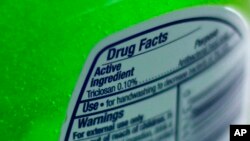U.S. regulators are calling on the makers of antimicrobial soaps to prove their products are more effective than plain soap and water.
The Food and Drug Administration (FDA) says the widespread use of these products may be contributing to rising rates of drug-resistant bacteria, and some evidence suggests they may even be harmful to your health.
The agency has issued a proposal that would require manufacturers to demonstrate that antimicrobial soaps lower rates of illness more than plain soap, and that the benefits outweigh potential risks.
There are about 2,000 antimicrobial soaps on the market today, according to the FDA.
Consumers may believe these products do a better job protecting them from getting sick, “but we don’t have any evidence that that is really the case, over simple soap and water,” said FDA Deputy Director Sandra Kweder.
Some test tube and animal studies suggest long-term exposure to the active ingredients in antimicrobial soaps can affect hormone levels and may be linked to cancer, but Kweder says these are preliminary.
“The challenge is to try and understand what those actually mean for effects on humans,” she said.
The Natural Resources Defense Council (NRDC), an environmental group that has sued the FDA over triclosan and triclocarban in soaps, welcomed the move.
“This is a good first step toward getting unsafe triclosan off the market,” says Mae Wu, an attorney with the NRDC. “FDA is finally taking concerns about triclosan seriously.”
Soap industry representatives say they are “perplexed” by the announcement.
In a statement, the Personal Care Products Council says it has given that FDA “in-depth data showing that antibacterial soaps are more effective in killing germs when compared with non-antibacterial soap.”
And the statement cites evidence that antimicrobial soaps do not contribute to antibiotic resistance.
Kweder says the FDA’s move is “all part of the general equation of, what are the benefits of using antibacterial products and how do they stack up against any potential risks.”
Last week, the FDA said the use of antibiotics to help healthy livestock grow better is contributing to rising drug resistance and asked drug makers to place tighter limits on their use.
If the proposed rule is approved, soap manufacturers would have to conduct clinical studies showing their products are safe and more effective than plain soap.
Kweder stressed the FDA is not discouraging hand-washing.
“Washing with plain soap and water is one of the most important steps people can take to avoid getting sick and prevent the spread of germs to others,” she said.
The rule would not apply to alcohol-based hand sanitizing gels and wipes that do not require water.
The FDA is asking for comments on the proposal over the next six months. If approved, Kweder expects the rule would go into effect in September of 2016.
The Food and Drug Administration (FDA) says the widespread use of these products may be contributing to rising rates of drug-resistant bacteria, and some evidence suggests they may even be harmful to your health.
The agency has issued a proposal that would require manufacturers to demonstrate that antimicrobial soaps lower rates of illness more than plain soap, and that the benefits outweigh potential risks.
There are about 2,000 antimicrobial soaps on the market today, according to the FDA.
Consumers may believe these products do a better job protecting them from getting sick, “but we don’t have any evidence that that is really the case, over simple soap and water,” said FDA Deputy Director Sandra Kweder.
Some test tube and animal studies suggest long-term exposure to the active ingredients in antimicrobial soaps can affect hormone levels and may be linked to cancer, but Kweder says these are preliminary.
“The challenge is to try and understand what those actually mean for effects on humans,” she said.
The Natural Resources Defense Council (NRDC), an environmental group that has sued the FDA over triclosan and triclocarban in soaps, welcomed the move.
“This is a good first step toward getting unsafe triclosan off the market,” says Mae Wu, an attorney with the NRDC. “FDA is finally taking concerns about triclosan seriously.”
Soap industry representatives say they are “perplexed” by the announcement.
In a statement, the Personal Care Products Council says it has given that FDA “in-depth data showing that antibacterial soaps are more effective in killing germs when compared with non-antibacterial soap.”
And the statement cites evidence that antimicrobial soaps do not contribute to antibiotic resistance.
Kweder says the FDA’s move is “all part of the general equation of, what are the benefits of using antibacterial products and how do they stack up against any potential risks.”
Last week, the FDA said the use of antibiotics to help healthy livestock grow better is contributing to rising drug resistance and asked drug makers to place tighter limits on their use.
If the proposed rule is approved, soap manufacturers would have to conduct clinical studies showing their products are safe and more effective than plain soap.
Kweder stressed the FDA is not discouraging hand-washing.
“Washing with plain soap and water is one of the most important steps people can take to avoid getting sick and prevent the spread of germs to others,” she said.
The rule would not apply to alcohol-based hand sanitizing gels and wipes that do not require water.
The FDA is asking for comments on the proposal over the next six months. If approved, Kweder expects the rule would go into effect in September of 2016.




